Representation Is the Office Snack Station’s Missing Ingredient
- By Lex Flamm
- Reading Time: 7 mins.
Denise Woodard’s allergy-friendly cookie company, Partake Foods, stocks products in over 10,000 stores nationwide. But starting a snack business wasn’t on her radar early in her career. In fact, she didn’t realize it was an option for a Black and Asian-American woman like her.
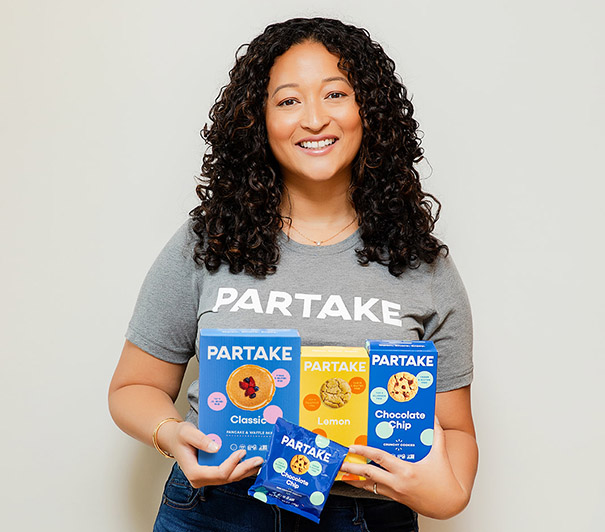
“When I was in college, my awareness of what career opportunities were possible in CPG [the consumer packaged goods industry] included only marketing and sales. There simply wasn’t exposure for me beyond that,” Woodard told The FruitGuys. “My parents worked hard to give me opportunities, but neither of them worked in corporate America.”
Woodard eventually found role models and gained experience, but that early lack of professional connections shaped her career. She saw firsthand what the data shows today: Women and people of color (POC) are underrepresented in the CPG and natural products spaces.
That puts would-be entrepreneurs and executives at a disadvantage everywhere from grocery stores to the office snack station. But people like Woodard, nonprofit groups like Project Potluck, and organizations like The FruitGuys are working to give them more of the spotlight.
The Representation Gap in CPG and Natural Products
POC make up about 38% of the US population and 27% of the shoppers who purchase natural and organic products, including foods, dietary supplements, and health and beauty items. But as recently as 2019, they filled just 18% of leadership positions in the natural products industry.
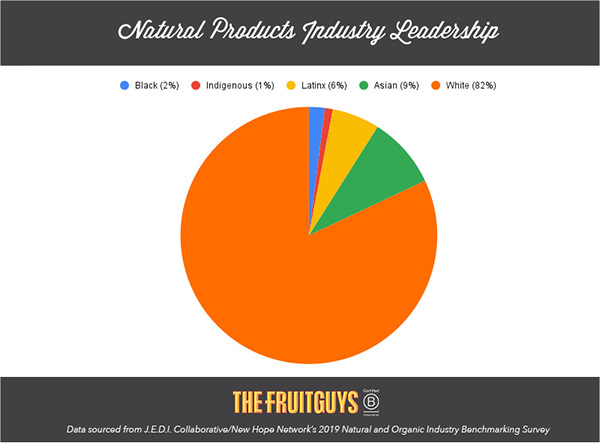
There are similar disparities in the CPG industry. Project Potluck—a nonprofit professional community for POC in CPG—estimates that POC fill just 16% of CPG leadership positions and make up 23% of business founders.
Those numbers are Project Potluck’s best guesses based on multiple sources of industry data.
“The most frustrating thing about this job is the lack of data,” said Kathleen Casanova, Project Potluck’s founding executive director. “It’s so minuscule that oftentimes we [POC people] just get lumped in with women.”
That’s evident in a 2021 survey of Fortune 500 boards by Deloitte. It found that on average, “women and other historically marginalized people” make up 35% of board members in the consumer staples (food) industry. White men make up the other 65%.
“POC are targeted often for their consumer dollars and are not represented, so that money is leaving their community. I think there’s a really important economic equity piece. That’s an important part of the story when it comes to why representation matters,” Casanova said.
The Story Behind the Gap
Both women and POC have historically faced discrimination and barriers to entry in the workforce. Those historic gaps have narrowed over time, but they persist today.
As Woodard put it, “the starting line for many women of color, given the lack of access, visibility, and equity, is just set further back. You see fewer of us because, even if we get to the starting line, we have to run further, faster to catch up—which is one of the reasons I’m so passionate about lifting as I climb.”
Some industry gaps are slower to close than others. For example, advocates have raised concerns about POC being continually overlooked in areas related to natural products and food movements, like veganism, where they don’t fit the customer stereotype.
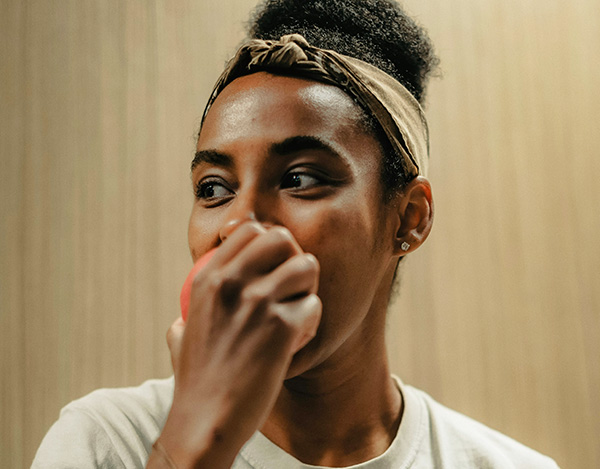
“When I’m thinking about natural and organic products, it’s an exclusive place. A lot of people think the consumer is a white woman shopping at Whole Foods and wearing yoga pants,” Casanova said.
This is despite the fact that, according to a 2016 Pew Research Center survey, Black Americans are almost three times more likely to be vegan than their peers. Many areas of the world where POC are a majority—including Jamaica, India, and Ethiopia—have longstanding traditions of plant-based eating.
Closing the Gap with Black Futures Fellowship
In 2020, Woodard started an annual fellowship program called Black Futures Fellowship to further the careers of active historically Black college or university (HBCU) students. The program matches those students with paid internships at CPG food and beverage companies, bringing diversity to the industry and, ultimately, the office snack station.

“If I can educate, inspire, and give students the opportunities in CPG food and beverage, perhaps over time the diversity of the industry can more directly represent the people it serves,” she said. She added that for her, “diversity” also includes “diversity of thought and life experience.”
Black Futures Fellowship’s mission mirrors that of industry groups like (included), a membership collective for BIPOC top executives in CPG that Woodard is part of. It also runs parallel to the work of Project Potluck.
Project Potluck Amplifies POC Voices in CPG
Project Potluck is a nonprofit professional community representing more than 1,400 POC in the CPG space from business owners to employees. Three CEOs of color founded the group: A Dozen Cousins Founder and CEO Ibraheem Basir, Alter Eco Foods CEO Arnulfo Ventura, and Mason Dixie Foods Founder and CEO Ayeshah Abuelhiga.
Project Potluck’s team is 100% POC. Founding Executive Director Kathleen Casanova, for example, has Afro-Cuban, Lebanese, and French-Cajun heritage.
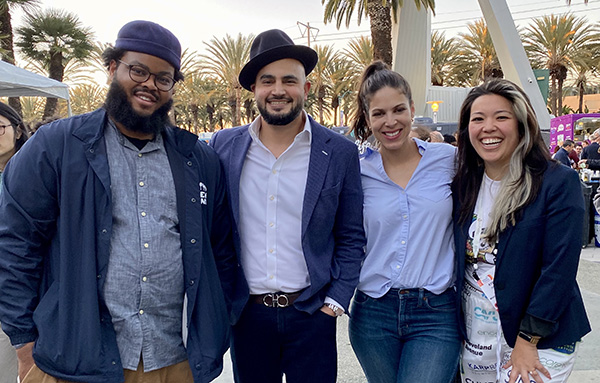
“We envision a world where a consumer can walk down the grocery aisle or convenience store aisle and really see themself reflected in not just the owners of the companies on the shelf but also the people contributing to the success of those companies,” Casanova said.
To achieve that vision, Project Potluck hosts virtual and in-person networking events for its members. It also runs a mentorship program to connect newcomers to the CPG space with experienced mentors. The nonprofit has made more than 300 connections so far.
“Our largest goal is to create a community for people of color and a home within CPG. Being underrepresented means that we exist but we’re not in one place—loud and strong and represented.“ Casanova said. “We feel like that fragmentation doesn’t allow for people to connect and share resources and help one another. The more connectivity and access to one another that we have, the stronger we can be represented, the louder our voice can be, and the more we can ask of the industry.”
Progress Toward Equity: Solutions & Stumbling Blocks
POC representation in the CPG industry has ticked up in recent years, with multiple companies funneling money toward minority-owned brands and entrepreneurs of color. But Casanova said progress has slowed in time with support for affirmative action. (The US Supreme Court ruled against the practice in college admissions in 2023.)
Speaking as an individual rather than a representative for Project Potluck, she shared her views on why.
“There was so much excitement for and interest in diversity and inclusion after George Floyd’s murder and during COVID, but unfortunately that enthusiasm has completely faded from so many companies and individuals,” she said. “People are almost frustrated that racism hasn’t been resolved in four years, and I think that’s challenging to people who see this as lifetime work.”
Now, Diversity, Equity, and Inclusion (DEI) programs at businesses and schools are also falling out of favor. To adapt to this changing sentiment, Casanova and Project Potluck have shifted their messaging to CPG brands, focusing on the financial benefits of diversity in addition to the altruistic ones.

Still, some companies continue supporting diverse brands in the CPG space simply because they feel it’s the right thing to do.
The FruitGuys Brings Diverse Brands to the Office Snack Station
At The FruitGuys, one of our top snack priorities is filling our snack boxes with products from companies owned by members of marginalized communities. We deliver those boxes to companies around the country to help them stock their office snack stations more equitably.
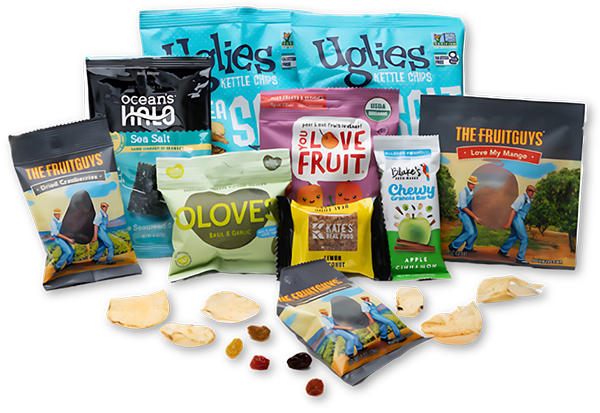
From November 2023–November 2024, 51% of the snacks we featured came from brands owned by women and/or people in the Asian American Pacific Islander (AAPI), Black, Latinx, Indigenous, LGBTQ+, BIPOC, and/or immigrant communities.
Here’s a closer look at that number:
- 45% women-owned
- 16% BIPOC-owned
- 13% AAPI-owned
- 4% LGBTQ+-owned
- 2% Latinx-owned
Why The FruitGuys Prioritizes Representation
“For a lot of POC, myself included, food is the heart and soul of our cultures. It provides a chance to learn, connect, and share our rich and unique histories with those around us,” said Daria Jackson, The FruitGuys’ snack category manager. “So, we aim to consciously use our sourcing platform to uplift those typically underrepresented in the CPG world. Because our representation matters just as much as anyone else’s.”
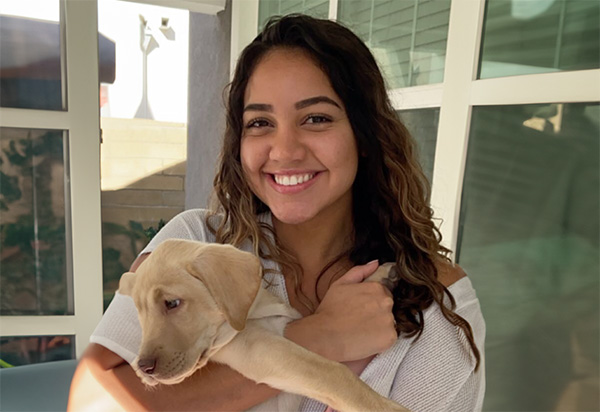
Daria is mixed race, with African-American heritage and “strong Cajun roots” on her father’s side of the family.
“His family left heavily racialized and segregated Louisiana for California in the 1940s and ’50s in search of a better life,” she said.
She has taken the lead in finding and building relationships for The FruitGuys with dozens of POC-owned brands, including Partake. It’s a constant work in progress.
“It’s difficult to find better-for-you snacks on the shelves. Combine that with the lack of POC representation in the CPG world, and you’ve found a huge gap in our food system that most don’t realize exists. That’s why we care so much about finding, sourcing, and amplifying small, underrepresented brands. The more snacks with clean ingredients and diverse ownership we can get in front of people and into office snack stations, the better their chances of reaching more consumers,” Daria said.


